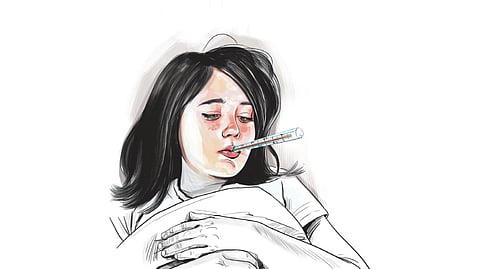

KOLLAM: A hospital-based study by doctors at Sree Gokulam Medical College, Thiruvananthapuram, has found an association between zinc deficiency and febrile seizures in children. The study, carried out between December 2022 and June 2024, analysed 158 children aged 6 to 72 months.
The findings revealed that nearly 50% of children who experienced seizures during fever had low zinc levels, compared to just 6% of children who had fever without seizures. The average zinc level in the blood of children with seizures was 81.1 micrograms per decilitre (µg/dl), significantly lower than the 142.4 µg/dl in children without seizures — a difference of 61.3 µg/dl, which is statistically significant (p< 0.01).
Nearly 48% of children in the seizure group were found to have low zinc levels (below 65 µg/dl), compared to only 6% in the control group.
The study was published in the International Journal of Contemporary Pediatrics. Dr Rekha S Nair, a paediatrician who was part of the research team, said zinc deficiency could be linked to poor intake of micronutrients.
“Due to lifestyle changes, our food habits have changed drastically. These children didn’t appear malnourished and may look healthy from the outside. However, they may still lack important nutrients like iron, vitamins C and D, and zinc. A larger-scale study is needed to confirm that zinc deficiency causes febrile seizures,” she said.
The study included 79 children with febrile seizures and 79 with fever but no seizures. All participants were matched by age and gender.
However, researchers found no significant connection between zinc levels and factors such as age, gender, seizure type (simple or complex), or seizure recurrence. “In contrast to iron deficiency, which is a known risk factor, we didn’t find strong evidence linking low zinc to seizure type or recurrence. This shows how complex zinc’s role is in the body and underlines the need for more research to assess whether zinc supplements could help prevent future seizures,” said Dr Lalitha Kailas, senior paediatrician and co-author of the study.
Febrile seizures affect children aged five months to six years and make up about 30% of all seizures in that age group. These convulsions are triggered by fever and happen in children who have no brain infections, metabolic problems, or history of seizures without fever. Most febrile seizures (80-85%) occur between 6 months and 3 years of age, with peak incidence around 18 months.
Zinc is an essential micronutrient that helps in growth, immunity, nerve function, and hormone regulation. It also supports brain health by helping regulate GABA, a key chemical in the brain that prevents overexcitation of nerve cells. The study suggests zinc may help reduce the risk of seizures by keeping brain signals in balance.